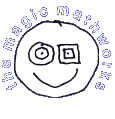Adult roles
In order that the children may gain maximum benefit from their visit, adults will want to bear in mind the principles outlined in this section.
The emphasis should be on developing mathematical thinking rather than on task completion. Adults sometimes have anxieties about children’s progress or levels of success manifested by an undue attention to ‘getting to the end’. It is more appropriate to seek ways to promote thought and reflection.
The important words are
prediction, connection, explanation and extension.
Good questions to ask are
How did you do that?
What do you think will happen?
What do you think now?
Does this remind you of anything else you have done?
Can you explain that?
Why do you think that works?
What else could you try?
If is important not to make connections for children but to sow the seeds for them making their own connections. Again it can be appropriate to become involved in doing an activity with them, as a co-learner, but not to do it for them.
Opportunities
In addition to the enhancement of mathematical experience for the children in your school this visit may also be seen as a professional development opportunity for yourselves. You will want to support the children in a variety of ways during their time at the circus but you will also find opportunities to talk about aspects of mathematics, its teaching and learning with any of the other adults present. Please don’t hesitate to do this or to seek any other assistance you need.
Another opportunity, away from the normal pressures of classroom work, is to stand back, to watch, to listen and to discuss observations with someone else. Those who rarely find the time to do this in a relaxed way in their day-to-day routines will particularly appreciate this chance.
You may wish to take notes of some of the activities in order to identify opportunities for follow-up or extension back in school, or to note ideas for using equipment which you may already have in alternative ways to stimulate mathematical thinking.
Progression
On the following charts we sketch a couple of examples of the way work at a station may be developed according to the level of the child. We have chosen ‘Magic masks’ from the section ‘Multiplication’, and ‘Handshakes’ from the section ‘Triangular numbers’. For the convenience of German teachers these schemes are given in both English and German.





